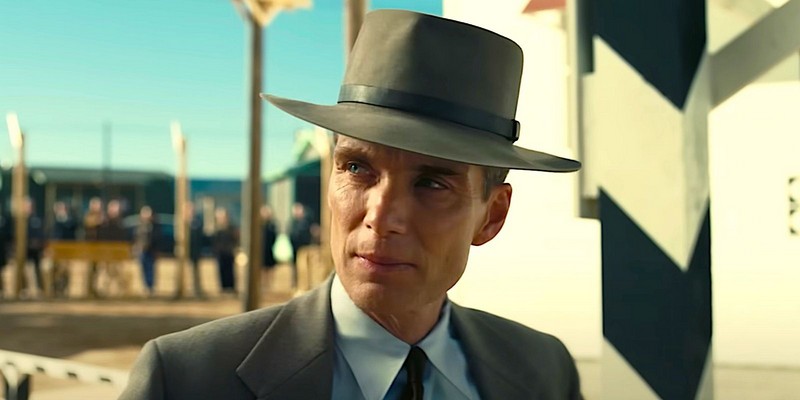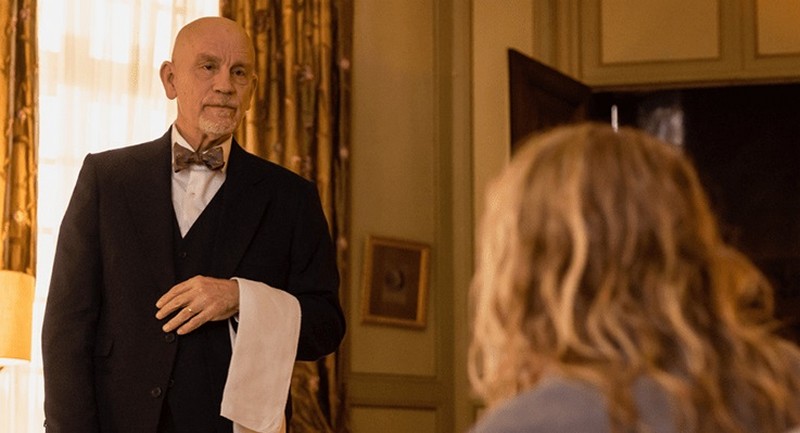Christopher Nolan has never shied away from the audacious. From his breakthrough in Memento (2000) to the time-travel twists of Tenet (2020), he embraces the challenge of doing the impossible and making it seem easy. His most notable work to date – Inception, the Dark Knight trilogy, Interstellar – has been in the sci-fi arena. But now he brings his immense talent and unique vision to a real life subject with Oppenheimer.
To say that the film depicts the life of J. Robert Oppenheimer, the so-called father of the atomic bomb, isn’t remotely adequate. While this is, in one sense, a biopic, it’s also something very different from what we’ve come to expect as a biopic. For example, the film is about a troubled math genius, so it should be like A Beautiful Mind (Ron Howard, 2001), right? Nope. This dazzling exploration of human fallibility is light years from Howard’s by-the-numbers honorific of John Nash. It’s like comparing a tricycle with a fighter jet – they both have wheels, but they’re in no way the same thing.

Nolan plays with form, with images, with sound and with conventional thinking. For a start, it plays out in three non-linear time frames (each distinguished by a different colour palette). Broadly the three sections cover Oppenheimer’s rise as a theoretical physicist to the development of the atomic bomb in 1945; a closed-door hearing in 1954 about his security clearance; and the 1959 Senate confirmation hearings for Lewis Strauss, Oppenheimer’s one-time boss at the Atomic Energy Commission. The structure perhaps shouldn’t be a surprise since fractured timelines are kind of a thing for Nolan, but its use here is unsettling and exciting.
The electricity of history ripples through the film. From the Spanish Civil War through to the Cold War, Communism to Nazism to McCarthyism, the early mathematical theory to the horrifying reality of nuclear war, the film covers a lot of ground. As with his other work, Nolan doesn’t take a beat to school the audience about these things. He expects you to know and to keep up with him. Going in, I knew it was three hours long, and was expecting the worst. But Nolan’s pacing is brilliant and – apart perhaps from a couple of moments in the third hour – I barely noticed the time. This continues through to the way the film unfolds. Grand spectacles are offset by moments of surprising intimacy. Fever dreams are counterpointed by harsh realities. Moments of madness are followed by moments of stunning beauty. It creates a kind of rhythm that sustains interest.
Nolan wrote the screenplay from the Pulitzer Prize-winning book American Prometheus: The Triumph and Tragedy of J. Robert Oppenheimer by Kai Bird and Martin J. Sherwin. How closely the film follows the book I can’t say. But given the scope and scale of the film, I’m guessing not terribly closely. The Prometheus allegory is an identifiable undercurrent here, and Nolan at least takes 30 seconds to explain the myth it’s based on.
Regular Nolan collaborator Hoyte Van Hoytema (Nope) produces some truly amazing visuals, complemented by Ruth De Jonge’s (Us) period-authentic production design. Ludwig Göransson (Black Panther: Wakanda Forever) provides a really gorgeous and powerful score. And it’s all lovingly assembled into a coherent whole by editor Jennifer Lame (Marriage Story). And although you may hear this a lot, all this excellent work really needs to be seen on the biggest screen possible and with the best sound possible. Do not watch this on your phone!
Through all of this though, Cillian Murphy (A Quiet Place Part II) shines as the titular Oppenheimer. This is a breathtaking performance from a consummate performer. It’s not particularly showy – perhaps in line with the real Oppenheimer – but it’s incredibly powerful. The way the film develops is kind of like a nuclear reaction in itself. Murphy is the nucleus; the other characters are like electrons colliding with him, producing their own particular reactions. Matt Damon (AIR) does his best Matt Damon as General Leslie Groves, the no-nonsense military head of the Manhattan Project; Rami Malek (Amsterdam) shows up in a surprisingly small but ultimately pivotal role as Groves’ assistant; and Australia’s own Jason Clarke (The Aftermath) does a great job as a government lawyer in the 1954 section. Robert Downey Jr makes a triumphant return from playing Iron Man for so many years in an excellent turn as Strauss. Benny Safdie (Licorice Pizza) provides strong support as the prickly Edward Teller, and Kenneth Branagh (Death on the Nile) pops up in a small cameo as Nils Bohr. And two of the most compelling performances come from Emily Blunt (Jungle Cruise) as Kitty Oppenheimer and Florence Pugh (Don’t Worry Darling) as Jean Tatlock, the key women in Oppenheimer’s life.
Oppenheimer is a monumental film. This is the art of cinema writ large. It might test you at times, it might not be as much fun as Barbie, it might even confuse occasionally; but in the end, it’s all worth it. And for its combination of technical excellence and its undeniably important messages, it’s a film that needs to be seen.
David Edwards
Other reviews you might enjoy:

David Edwards is the editor of The Blurb and a contributor on film and television





